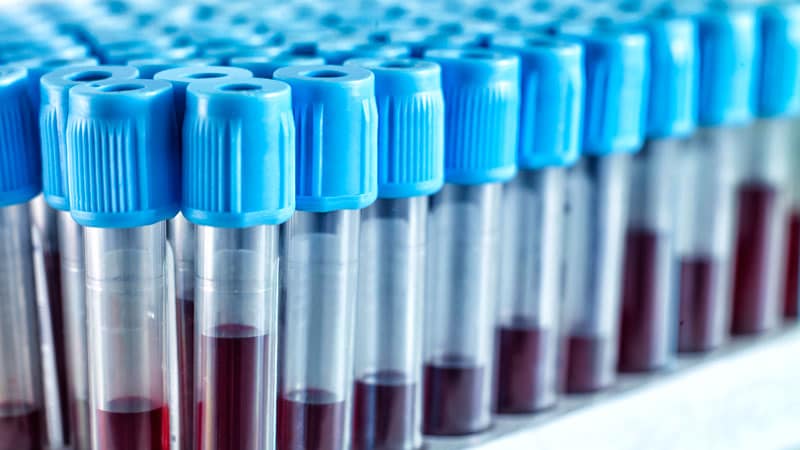[ad_1]
BERLIN — An individual’s profile of antibody responses to a range of herpes viruses and encapsulated bacteria such as Streptococcus could predict the onset of inflammatory bowel disease (IBD) up to 10 years prior to diagnosis, with differential responses between Crohn’s disease and ulcerative colitis, a new study suggested.
The research was presented at the European Crohn’s and Colitis Organisation (ECCO) 2025 Congress.
“High-throughput and high-resolution antibody profiling delineates a previously underappreciated landscape of selective serological responses in inflammatory bowel disease,” said study presenter Arno R. Bourgonje, MD, PhD, of the Henry D. Janowitz Division of Gastroenterology, Icahn School of Medicine at Mount Sinai, New York City.
The discovery represents just the “tip of the iceberg” in terms of understanding how antibody response could predict IBD onset, he added. Although validation studies are ongoing, the findings “allow for novel insights into disease pathogenesis and also for allowing for disease prediction,” Bourgonje said.
In IBD, the integrity of the intestinal barrier is compromised and luminal agents, like bacteria, can leak through, which leads to immune activation, Bourgonje said.
However, only a few serological antibody responses are known to occur in IBD, such as antibodies against the yeast Saccharomyces cerevisiae and those against the cytoplasm of neutrophils, he said.
But most antibody responses are directed against bacteria, Bourgonje noted. The gut microbiome represents thousands of different bacterial species, each of which encode for thousands of different genes, representing a tremendous number of potential antigens, he said. But conventional antibody profiling technologies weren’t powerful enough to identify antibodies in patients with IBD that signal an immune response to potential antigens in the gut.
To get at that problem, the researchers recently leveraged a high-throughput technology called phage-display immunoprecipitation sequencing (PhIP-Seq) to look for specific immune-based biomarker signatures in the blood of individuals with IBD. This effort revealed a distinct repertoire of antibodies not only against bacteria but also against viruses and cell antigens.
The researchers next turned their sights on discovering whether they could find evidence of immunological alterations before IBD onset to enable disease prediction.
Predictive Signatures Found
The team used a longitudinal preclinical IBD cohort called PREDICTS (PRoteomic Evaluation and Discovery in an IBD Cohort of Tri-service Subjects) that is housed in the US Department of Defense Serum Repository.
Using PhIP-Seq, the researchers analyzed serum samples from 200 individuals who developed Crohn’s disease, 200 who developed ulcerative colitis, and 100 non-IBD controls matched for age, sex, race, and study time point. The samples were collected approximately 2 years, 4 years, and 10 years prior to diagnosis as well around the time of diagnosis.
The results showed that compared with healthy controls, the diversity of the antibody repertoire was significantly lower in the sera of individuals with preclinical Crohn’s disease (P P P
The study also found that compared with healthy controls, antibody responses in individuals with preclinical Crohn’s disease against herpes viruses such as Epstein–Barr virus (EBV), cytomegalovirus (CMV), and herpes simplex virus (HSV)-1 and HSV-2 were significantly higher approximately 10 years prior to the diagnosis of Crohn’s disease, whereas anti-Streptococcus responses were lower.
In individuals with ulcerative colitis, antibody responses to EBV, CMV, HSV-1, and influenza viruses were significantly higher than that in healthy controls approximately 10 years prior to diagnosis, whereas anti-rhinovirus responses were lower.
Further analysis demonstrated that antibody responses to CMV and EBV proteins increased over the course of the preclinical phase of Crohn’s disease vs healthy controls (P = .008 and P = .011, respectively).
Similarly, autoantibody responses to MAP-kinase-activating death domain increased during the preclinical phase of ulcerative colitis vs healthy controls (P = .0025), whereas anti-Streptococcus responses decreased (P = .005).
Interestingly, no one single antibody response difference with healthy controls was able to accurately predict the onset of IBD 10 years prior to diagnosis, but distinct sets of antibody responses were, with area under the receiver operating characteristic curve of 0.90 for Crohn’s disease and 0.84 for ulcerative colitis.
A Promising Start
The study has potential to be useful for identifying people at risk for IBD, Robin Dart, MD, PhD, a consultant gastroenterologist at Guy’s and St Thomas Hospital, London, England, who co-chaired the session, told Medscape Medical News.
The difference in antibody responses to viral and bacterial antigens between Crohn’s disease and ulcerative colitis could point toward underlying biological mechanisms, although it is “too early to say,” Dart said.
However, “when you do these kind of big fishing exercises” and identify microbes may be implicated in IBD, “you end up finding more questions than answers,” although that “can only be a good thing,” he added.
Bourgonje noted that the study cohort consisted entirely of men enrolled in the US Army, limiting the applicability of the findings. Another limitation was that researchers were unable to control smoking, antibiotic use, and diet, all of which could have affected the results.
This study was funded by the Leona M. and Harry B. Helmsley Charitable Trust.
Bourgonje declared relationships with Janssen Pharmaceuticals, Ferring, AbbVie. Other authors also declared numerous relationships.
[ad_2]
Source link : https://www.medscape.com/viewarticle/antibody-profiles-predict-crohns-and-ulcerative-colitis-10-2025a10004pz?src=rss
Author :
Publish date : 2025-02-24 11:43:41
Copyright for syndicated content belongs to the linked Source.
